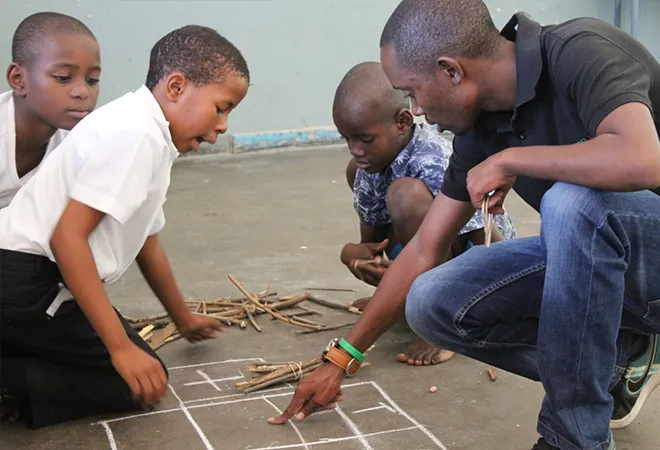
This article is part of the series — Africa in 2021.
There was a learning crisis in Botswana even before COVID-19 shuttered schools down. A third of grade 5 students in 2017 were unable to do basic subtraction and a fifth unable to read a simple paragraph. This learning crisis will likely be worsened by school closures due to the COVID-19 pandemic.
To address these learning gaps, the Botswana government had committed to focusing on foundational literacy and numeracy. If students do not know how to recognise numbers, that should be the focus of instruction, regardless of which grade they are in, until they do. This approach is reflected in the national Education and Training Sector Strategic Plan. Moreover, the government of Botswana has operationalised this policy into action. The Ministry of Basic Education (MoBE) partnered with Young 1ove, one of the largest NGOs in the country; UNICEF; and USAID to scale-up evidence-based education programmes to all primary schools nationwide.
To address these learning gaps, the Botswana government had committed to focusing on foundational literacy and numeracy.
One particularly promising education reform is a programme called “Teaching at the Right Level (TaRL),” which groups students by learning level rather than age or grade to meet students where they are. The programme originated in India and was developed over 20 years by Pratham, one of the largest education NGOs in the world. TaRL has been rigorously evaluated by Nobel Laureates Abhijit Banerjee and Esther Duflo and shown to be one of the most cost-effective methods to improve learning through multiple randomised controlled trials.
Prior to the pandemic, TaRL had reached 20 percent of primary schools in Botswana. However, TaRL implementation faced an abrupt halt when the COVID-19 pandemic closed schools. In response, the Ministry of Basic Education and Young 1ove rapidly pivoted to find innovative methods to deliver aspects of the TaRL approach outside of school and in the household, including meeting students where they are, targeting instruction to their level, and focusing on the foundations.
This “low-tech” approach which uses simple feature phones is feasible, scalable, and can reach those who need it most.
A majority of households in Botswana lack computers and internet access, so reaching families at home proved difficult. However, most families own at least one mobile phone, which is often shared among family members. So, Young 1ove met households where they are and reached out to them via mobile phone to provide distance education. This “low-tech” approach which uses simple feature phones is feasible, scalable, and can reach those who need it most. This approach stands in contrast to “high-tech” approaches, which rely on the internet or computers which are often more expensive and are harder to access.
The programme provided weekly SMS messages and live phone calls from instructors for virtual over-the-phone tutoring teaching basic numeracy concepts, such as place value or subtraction. In addition, real time data was collected on student learning, and instruction was targeted based on the child’s level and progress. Each call was around 15-20 minutes.
A growing number of governments, global advocacy organisations, and multilateral institutions are compelled by the possibilities of such approaches to provide a high-quality education.
Demand for the programme was sky-high: 99 percent of parents wanted to continue the programme after the first four weeks. One parent shared her thoughts about the interventions: “The programme really helped us a lot. So much that my child now understands division and multiplication because of the homework sent. I hope that we can continue with this intervention. When you’re a parent, there’s only so much you can accomplish alone. But with joint efforts from teachers and Young 1ove, students will learn better. I am already seeing improvements in my child’s comprehension.”
The intervention was evaluated rigorously with a randomised controlled trial in partnership with the University of Oxford, the Jameel Poverty Action Lab (J-PAL), and Columbia University (Angrist et al. 2020). This evaluation has provided some of the first experimental evidence on distance learning during the pandemic and revealed substantial effects on learning. After four weeks, there was a 31 percent drop in the number of students who could not solve any numerical operations. Even after schools reopened, the intervention continued to produce learning gains.
The pandemic forced innovation and shone a light on the ability for learning to happen no matter the circumstances.
Young 1ove is now working to scale this SMS and phone call intervention to other countries. A growing number of governments, global advocacy organisations, and multilateral institutions are compelled by the possibilities of such approaches to provide a high-quality education. UNICEF is calling for substantial investment to reach every child with improved remote learning options. The World Bank cited the Botswana intervention under their “good buy” for improving global learning. The World Bank is also conducting a replication trial of the SMS and phone call intervention in Nepal.
As Botswana has demonstrated, the Teaching at the Right Level approach — delivered both in schools and its principles delivered virtually through mobile phones — is a way to address the learning crisis and build back better to enable all children to achieve foundational learning. The pandemic forced innovation and shone a light on the ability for learning to happen no matter the circumstances. The Botswana experience, both before COVID-19 and during, has an important lesson: Meet students where they are and focus relentlessly on the foundations.
Pansiri, O. Nkobi and Gabatshwane T. Tsayang. 2017. “A Situational Analysis of Basic Literacy and Numeracy levels at early grade levels in Botswana.” Background Report.
Banerjee, Abhijit, Rukmini Banerji, James Berry, Esther Duflo, Harini Kannan, Shobhini Mukerji, Marc Shotland, and Michael Walton. “From proof of concept to scalable policies: Challenges and solutions, with an application.” Journal of Economic Perspectives 31, no. 4 (2017): 73-102.
The views expressed above belong to the author(s). ORF research and analyses now available on Telegram! Click here to access our curated content — blogs, longforms and interviews.




 PREV
PREV



